 Humboldt County’s world-renowned cannabis industry has lured weed connoisseurs to the redwood coast in search of that perfect high since the mid-to-late ‘60s. In 2017, after decades of prohibition and a War on Drugs, Humboldt finally placed the proverbial welcome mat at our beloved Redwood Curtain inviting any visitors 21+ to enjoy legal canna-tourism. Today, visitors across all demographics and backgrounds are demonstrating interest in Humboldt’s budding canna-tourism industry, be they canna-curious, avid consumers, or invested entrepreneurs in canna-business. The industry is blossoming in the legal market, and Humboldt’s remote, rural and breath-taking landscapes are poised to build a world-class legal cannabis tourist destination.
Humboldt County’s world-renowned cannabis industry has lured weed connoisseurs to the redwood coast in search of that perfect high since the mid-to-late ‘60s. In 2017, after decades of prohibition and a War on Drugs, Humboldt finally placed the proverbial welcome mat at our beloved Redwood Curtain inviting any visitors 21+ to enjoy legal canna-tourism. Today, visitors across all demographics and backgrounds are demonstrating interest in Humboldt’s budding canna-tourism industry, be they canna-curious, avid consumers, or invested entrepreneurs in canna-business. The industry is blossoming in the legal market, and Humboldt’s remote, rural and breath-taking landscapes are poised to build a world-class legal cannabis tourist destination.
Finding Retreat Behind the Redwood Curtain
The majesty and wonder of the world’s tallest trees, our regal redwoods, have drawn both residents and travelers alike to Humboldt. In the mid-to-late ‘60s, the back-to-the-lander movement drew folks seeking retreat from the fast-paced Bay Area buzz into our isolated, rural landscapes for natural living and simpler lifestyles. For many, growing cannabis throughout the Humboldt region and selling in the illicit market became the financial subsidy to the dreamy, harmonious, and sought-after rural lifestyle. While cultivators successfully actualized their dreams of homesteads and organic living, for many, their dreams were not realized without paying the high costs of navigating a treacherous and often punitive war on drugs. Today, however, Humboldt has the opportunity to share a rich and engaging story of cannabis, community, resiliency, and the importance of cultivating sustainable, high-quality, craft cannabis while providing visitors with an unparalleled glimpse into the laid-back lifestyles behind the redwood curtain.
Pioneering the Canna-Tourism Trail
Humboldt Cannabis Tours :: The First Permitted Tour Operator
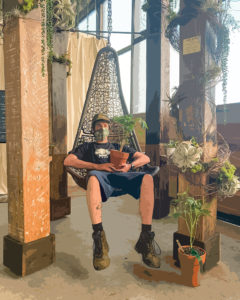 Matt Kurth, Owner of Humboldt Cannabis Tours, is the first licensed and permitted tour operator in Humboldt County. With a background in recreation administration, Kurth saw the perfect opportunity to take his river guide skills to the next level offering visitors guided cannabis farm and dispensary tours. Though, actualizing his vision was not quite a “walk on the farm.”
Matt Kurth, Owner of Humboldt Cannabis Tours, is the first licensed and permitted tour operator in Humboldt County. With a background in recreation administration, Kurth saw the perfect opportunity to take his river guide skills to the next level offering visitors guided cannabis farm and dispensary tours. Though, actualizing his vision was not quite a “walk on the farm.”
Three days after Humboldt County passed Ordinance 1.0, Kurth submitted his Business License Application. Likely overwhelmed by the influx of applications, and unsure of how Canna-Tourism fit into the mix, Kurth’s application stalled in the Planning Department for nearly two years; Ordinance 1.0 had not yet considered tourism a part of the legal cannabis market; furthermore, tourism does not require cannabis-specific licensing. So, the county required him to apply for a Special Permit (essentially, a permit the county can require of a business when their business model doesn’t quite fit pre-existing processes, but they’d like to design a consistent format for that business model). Kurth pioneered the charter tour process in tandem with the County, and while the process was arduous, Kurth’s tour company legally launched operations this month on Sunday, June 6th, and is already booking multiple tours each week.
Kurth was successful in obtaining his Special Permit, however, it did not come without restrictions and conditions. For example, Humboldt Cannabis Tours may only visit legally compliant, licensed farms permitted for tourism (which did not exist until this year) and dispensaries. He must abide by all California rules and requirements, such as maintaining his required insurance coverage and a Charter Party Permit, more specifically a Transportation Charter Permit (TCP). Additionally, Kurth may not park his van at his home, he must garage it off-premises, due to neighbors’ voiced concerns about a cannabis business in their neighborhood. Any future commercial operators wishing to offer chartered cannabis tours in Humboldt County will now be expected to follow the same process Kurth’s company underwent to receive their Special Permit.
Today, you’ll see Kurth chauffeuring guests to licensed farms and dispensaries in his svelte, black, 13-passenger tour van where his raft-guide recipe for success has been amended for cannabis tours: meet up, introductions, travel to x, y, and z, lunch, travel to a, b, and c, then wrap up and return to Eureka. 🙂
While Ordinance 1.0 did not initially consider the potential of tourism with the licensed cannabis industry, Kurth’s business license application for Humboldt Cannabis Tours sparked the county’s awareness of, and potential for, canna-tourism as a viable commercial leg of the industry in Ordinance 2.0 with Performance Standards for Public Accommodation (Section 55.4.12.14 and specifically for Tour Operators, Section 55.4.12.15). In Kurth’s opinion, some of the current regulations, like all regulations, need to be adjusted, though he’s pleased that the Planning Department has added a check-box to cannabis permit applications to indicate applicants are interested in including tourism opportunities as part of their business operations. He encourages cannabis businesses to apply for their tourism permits and ready themselves for the budding canna-tourism industry, “A lot of people have heard about the difficulties of getting a public accommodation permit. I want to get the word out that some of those things [difficulties] have changed. The Planning Department has changed its interpretation of the regulations. You still need to comply with the ADA standards but it’s much, much easier now with the parking, and the bathrooms and the garden paths… all that stuff has been worked out and it’s not an issue anymore.”
Huckleberry Hill Farms :: The First Licensed and Permitted On-Site Farm Tour
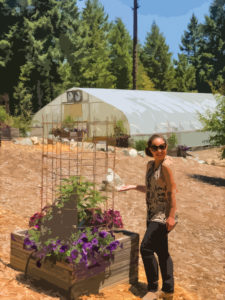 As of January 2021, Huckleberry Hill Farms in Whitethorn is Humboldt’s first permitted farm to offer on-site tours with his first commercial tours starting up this month (June 2021). Owner/Operator, Johnny Casali began his permit for on-site tours under Ordinance 2.0 in 2017. Like Humboldt Cannabis Tours, Casali was required to apply for a Special Permit; however, unlike Kurth’s, Casali’s Special Permit is a part of his licensed cannabis cultivation business.
As of January 2021, Huckleberry Hill Farms in Whitethorn is Humboldt’s first permitted farm to offer on-site tours with his first commercial tours starting up this month (June 2021). Owner/Operator, Johnny Casali began his permit for on-site tours under Ordinance 2.0 in 2017. Like Humboldt Cannabis Tours, Casali was required to apply for a Special Permit; however, unlike Kurth’s, Casali’s Special Permit is a part of his licensed cannabis cultivation business.
Cannabis Farms, in general, carry the greater burden in obtaining their tourism permits due to the limitation set forth by the required Performance Standards for Public Accommodation. For example, one limiting hurdle is that farms interested in offering tours “must be located on a paved road with a centerline stripe, or paved meeting the Category 4 Standard” (Section 55.4.12.14.4.5.1). They must also provide flat parking for lift-loading and unloading and wheelchair accessibility. Walkways and ramps must be no more than a 5% grade and at least 6ft wide wherever the public is allowed, and bathrooms must be ADA accessible.
As aforementioned, the Planning Department originally had strict interpretations of ADA compliance, requiring permanent property infrastructure that imposed excessive expenses that simply made on-site tours unlikely for most rural, Humboldt cultivators. While Casali does have the good fortune of having a farm located along a Category 4 Road, obtaining his Special Permit required working closely with Planning Director, John Ford, to navigate what could work realistically to meet ADA requirements for his mountainside cannabis farm. Together they paved a pathway forward (pun not intended), which will hopefully make farm tours more feasible for other farms too, all the while ensuring accessibility for all public visitors. Some of the allowances which made it possible for Casali to obtain his special permit include the use of an ADA-accessible Porta-potty, rather than a permanent bathroom; pathways may be hard-granite paths rather than pavement; and parking pads may be plywood mats, rather than paved concrete slabs. Road and ADA requirements will certainly continue to remain a major hurdle for Humboldt’s more remote farms and cultivators unless addressed on a regulatory level.
Although Casali is indeed permitted to host commercial tours at Huckleberry Hill Farms, some restrictions still pose hindrances for Casali’s long-term farm tour vision; his special permit requires that only a third party (like Kurth’s business, Humboldt Cannabis Tours) brings groups to the farm, overnight stays are not an option, nor are on-site sales or consumption, and guests may not go into the greenhouses. Over time, as Casali builds a successful, compliant, and transparent tour operation on his farm, he hopes to see some of these restrictions lifted. For the time being, however, Casali is intent on following all of the rules set forth by his permit, building trust with the county planning department.
Casali is passionate about sharing the legacy of cannabis with visitors, “It’s important that people know where a multi-billion dollar industry was created and in my opinion, the Emerald Triangle is very special and unique.” The story Casali shares is not about being the “best grower” or having the “best product.” It’s about sharing the legacy of the spirit of the Humboldt Community, “People come for the world’s best cannabis, but they move here for this community because it’s so magical and so special.” He believes that tour operators “only have one chance to have a major impact on the people to spread the Emerald Triangle message. For so many years we all fought for this harmless plant and we were told that it was bad and it wasn’t good, and we were breaking the law, and now to come full circle to have it be legal is so special. We finally get to be openly proud of what [we’re doing].”
Casali does not take the responsibility of representing the Humboldt cannabis industry lightly. He is motivated to inspire “guests to leave with a totally different perception of who [we] are as farmers, who [we] are as people, and who [we] are as a community. Together, hopefully, we can make an impact on those people that are eventually going to be the ones that dictate whether or not we survive or we don’t.”
The Emerald Kid, Terp Mansion :: The First Licensed and Permitted Micro-business including Tourism
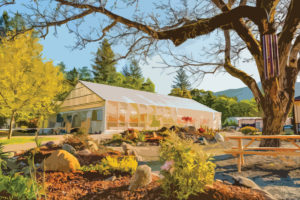 Lucas Sanders aka “The Emerald Kid” at the “Terp Mansion” had a completely different experience navigating the process of obtaining his permit. He submitted an application for a Conditional Use Permit (CUP) for his micro-business which includes manufacturing, wholesale nursery, and distribution. At the time, tourism wasn’t on his radar. In contrast to Kurth and Casali who both applied for Special Permits to integrate tourism into their business models, Sanders was urged by county planners to include tourism in his micro business CUP, which he did. When it came time for his hearing in front of the Board of Supervisors, this was the first CUP to be reviewed regarding tourism, and it was unanimously approved, “thus kicking down the door for others,” he revels. Sanders’ farm is 100% ADA accessible and insured, located alongside category 4 roads in the heart of Willow Creek, CA with all commercial buildings (not ag exempt buildings) and a fully constructed permanent bathroom. As a result of his public accommodation allowance, Sanders IS allowed to offer compliant, on-site consumption (via fully tested, tracked, and taxed samples, donated back to his business), though may not host overnight stays, nor is he allowed to make on-site sales, “yet,” he touts, as per county restrictions. His permit does not require a third party for hosting tours.
Lucas Sanders aka “The Emerald Kid” at the “Terp Mansion” had a completely different experience navigating the process of obtaining his permit. He submitted an application for a Conditional Use Permit (CUP) for his micro-business which includes manufacturing, wholesale nursery, and distribution. At the time, tourism wasn’t on his radar. In contrast to Kurth and Casali who both applied for Special Permits to integrate tourism into their business models, Sanders was urged by county planners to include tourism in his micro business CUP, which he did. When it came time for his hearing in front of the Board of Supervisors, this was the first CUP to be reviewed regarding tourism, and it was unanimously approved, “thus kicking down the door for others,” he revels. Sanders’ farm is 100% ADA accessible and insured, located alongside category 4 roads in the heart of Willow Creek, CA with all commercial buildings (not ag exempt buildings) and a fully constructed permanent bathroom. As a result of his public accommodation allowance, Sanders IS allowed to offer compliant, on-site consumption (via fully tested, tracked, and taxed samples, donated back to his business), though may not host overnight stays, nor is he allowed to make on-site sales, “yet,” he touts, as per county restrictions. His permit does not require a third party for hosting tours.
The Terp Mansion is a bit of an anomaly in the world of canna-business, as according to Sanders, “it’s the first micro-business in Humboldt, and possibly the world, allowing for cultivation, manufacturing, distribution, and nursery sales on an actual homestead.” He hopes to portray to the world what a small farm can do, emphasizing how much better and sustainable small farming is in comparison to big ag… quality over quantity. He’d like to normalize modern homesteading and cannabis at home.
Sanders has been pleasantly surprised by the overwhelming response he’s already received for his tours. With over 100,000 social media followers the first marketing of his cannabis tours was posted on a Friday and received over 100 inquiries by the following Tuesday!
Sanders believes that tourism will be a critical component of Humboldt’s cannabis industry. He encourages other businesses to “use tourism to your benefit, use it for marketing, brand awareness, and sustainability awareness.” He believes Humboldt has the opportunity to provide an experience for visitors to feel the Humboldt vibe.
The Humboldt Social :: Highlighting the Hospitality Experience
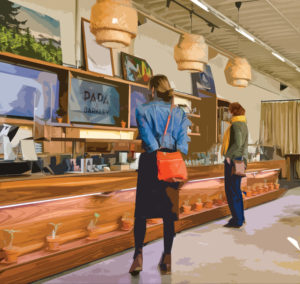 Humboldt Social’s CEO, Aaron Sweat, oversees 4 unique tourism opportunities traversing various hospitality experiences: The Humboldt Bay Social Club/Oyster Beach (lodging, restaurant, event venue), Social Nature (dispensary), The Papa & Barkley Social (dispensary, food truck, spa, event venue), and the Scotia Lodge (lodging, event venue). Their goal is to normalize cannabis through hospitality, essentially serving as an extension of Napa for cannabis through streamlining access to cannabis and normalizing it in a variety of public settings; in essence, making the consumption of cannabis as standard and accessible as enjoying a glass of wine. Their hospitality model is founded in safety, education, fun, and inclusivity, “we will have failed if we are known as a bud and breakfast,” suggested Sweat, indicating that the bud and breakfast model is exclusive to canna-consumers.
Humboldt Social’s CEO, Aaron Sweat, oversees 4 unique tourism opportunities traversing various hospitality experiences: The Humboldt Bay Social Club/Oyster Beach (lodging, restaurant, event venue), Social Nature (dispensary), The Papa & Barkley Social (dispensary, food truck, spa, event venue), and the Scotia Lodge (lodging, event venue). Their goal is to normalize cannabis through hospitality, essentially serving as an extension of Napa for cannabis through streamlining access to cannabis and normalizing it in a variety of public settings; in essence, making the consumption of cannabis as standard and accessible as enjoying a glass of wine. Their hospitality model is founded in safety, education, fun, and inclusivity, “we will have failed if we are known as a bud and breakfast,” suggested Sweat, indicating that the bud and breakfast model is exclusive to canna-consumers.
One of the vehicles by which the Humboldt Social franchise normalizes cannabis with their business models is to surround themselves with other independent businesses; for example, the P&B Social is host to a day spa, a food truck, a dispensary, and an event space, all of which create a symbiotic, inviting vibe for visitors to relax, eat, consume and enjoy as they tap into the many experiences offered. In regards to Special Permits, Humboldt Social works closely with Papa and Barkley, managing their pre-existing retail licensing.
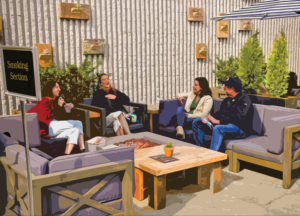 Another approach Humboldt Social is taking to normalize the cannabis experience is to create places where women want to hang out. “Women make the majority of family spending decisions,” Sweat asserted. By offering canna-inclusive, welcoming, social environments, the Socials hope to invite women and their families to spend (time and money) in their businesses, overcoming any reservations and or stigmas to mingling among cannabis. As a woman-led business entity itself (with Co-Owner Amy Cirincione-O’Connor at the helm) the Socials are committed to partnering with women-led businesses in their dispensaries. They’ve selected three women-led farms (Dew Point, Emerald Queen, and Sunrise Mountain Farms) to fill the shelves of their curated product selection at their two dispensaries. In emphasizing women-led businesses the Socials aim to target all demographics, and especially the women-dominant consumer base, in the hopes of “unlocking lingering fears that still see cannabis as reefer madness. We have an amazing space for so many different types of people to enjoy from the heavy-hitters to the canna-curious.”
Another approach Humboldt Social is taking to normalize the cannabis experience is to create places where women want to hang out. “Women make the majority of family spending decisions,” Sweat asserted. By offering canna-inclusive, welcoming, social environments, the Socials hope to invite women and their families to spend (time and money) in their businesses, overcoming any reservations and or stigmas to mingling among cannabis. As a woman-led business entity itself (with Co-Owner Amy Cirincione-O’Connor at the helm) the Socials are committed to partnering with women-led businesses in their dispensaries. They’ve selected three women-led farms (Dew Point, Emerald Queen, and Sunrise Mountain Farms) to fill the shelves of their curated product selection at their two dispensaries. In emphasizing women-led businesses the Socials aim to target all demographics, and especially the women-dominant consumer base, in the hopes of “unlocking lingering fears that still see cannabis as reefer madness. We have an amazing space for so many different types of people to enjoy from the heavy-hitters to the canna-curious.”
Regardless of their strategies used to create canna-inclusive social environments throughout Humboldt County, Sweat promises the Socials are “going to do our best to be the best representation of what Humboldt can be.”
The Future of Humboldt’s Canna-Tourism
A consistent sentiment among each of these tourism models is that each business is committed to and invested in Humboldt, and each sees its role in telling the Humboldt story as a responsibility. While the pathway to canna-tourism is finally paved, there is still a long way to go in making tourism a viable option for many canna-businesses. “Now is the time for businesses to get ready for tourism,” urges Kurth. “John Ford, specifically, has expressed to me that he wants to permit tourism. He’s ready to move forward with it. A lot of the supervisors are too, and they want people to apply to host tourism.” The future is bright, and the time is now to begin considering how canna-tourism will fit into your business model.

